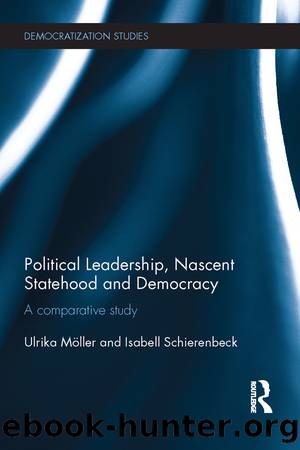Political Leadership, Nascent Statehood and Democracy: A Comparative Study by Ulrika Moller & Isabell Schierenbeck

Author:Ulrika Moller & Isabell Schierenbeck [Moller, Ulrika & Schierenbeck, Isabell]
Language: eng
Format: epub
Tags: Political Science, General
ISBN: 9781317673101
Google: uKbAAwAAQBAJ
Goodreads: 22507860
Publisher: Routledge
Published: 2014-06-05T00:00:00+00:00
Summing up symbolic leadership
The relational struggle of the Pakistani state project was characterised by a strong formal position of a former national leader and weak directives on how to proceed with the constitutional process to facilitate representative government. As a national leader, Jinnah gathered together Indian Muslims through political opposition against Congress ministries for discriminating against Muslims and by warning against the continuous grievances of Indiaâs Muslims as subjects under the âHindu Rajâ. His consistent demand for a political voice for the Muslim League on behalf of all of Indiaâs Muslims on the All-India level radicalised through the demand for a Muslim homeland turned him into their Quaid-i-Azam. The political authority he entertained through public devotion was combined with a strong organisational control over the Muslim League as its uncontested central leader with a firm grip on the choice of provincial leaders.
As the Governor General of India, Jinnah formalised his own personal authority for the sake of enabling a process of formalising of political authority towards representative government. Yet in spite of his double positions as Governor General and chair of the Constituent Assembly, he did not manage to initiate a constitutional process with potential to develop representative government. In the context of an obstructed constitutional process, there was a concentration of power to the Governor Generalâs office at the expense of the government and the Legislative Assembly. Further, the stalled constitutional process delayed the political voice of the citizens of Pakistan, as well as the establishment of rights to political opposition. At nascent statehood, relational leadership in Pakistan did not move from a dedicated followership through personal authority for the sake of national mobilisation towards a formalisation of political authority and citizen rights for the sake of state building.
Download
This site does not store any files on its server. We only index and link to content provided by other sites. Please contact the content providers to delete copyright contents if any and email us, we'll remove relevant links or contents immediately.
| Anthropology | Archaeology |
| Philosophy | Politics & Government |
| Social Sciences | Sociology |
| Women's Studies |
Born to Run: by Christopher McDougall(7120)
The Leavers by Lisa Ko(6945)
iGen by Jean M. Twenge(5408)
Sapiens by Yuval Noah Harari(5366)
Spare by Prince Harry The Duke of Sussex(5176)
The Kite Runner by Khaled Hosseini(5170)
Machine Learning at Scale with H2O by Gregory Keys | David Whiting(4292)
Bullshit Jobs by David Graeber(4179)
Never by Ken Follett(3937)
Goodbye Paradise(3799)
Livewired by David Eagleman(3764)
Fairy Tale by Stephen King(3370)
A Dictionary of Sociology by Unknown(3073)
Harry Potter 4 - Harry Potter and The Goblet of Fire by J.K.Rowling(3060)
The Social Psychology of Inequality by Unknown(3018)
The Club by A.L. Brooks(2919)
Will by Will Smith(2908)
0041152001443424520 .pdf by Unknown(2843)
People of the Earth: An Introduction to World Prehistory by Dr. Brian Fagan & Nadia Durrani(2727)
